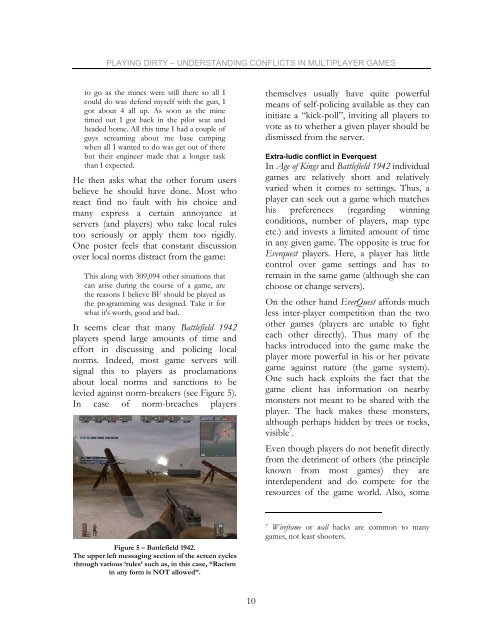Playing Dirty â Understanding Conflicts In Multiplayer Games
Playing Dirty â Understanding Conflicts In Multiplayer Games
Playing Dirty â Understanding Conflicts In Multiplayer Games
You also want an ePaper? Increase the reach of your titles
YUMPU automatically turns print PDFs into web optimized ePapers that Google loves.
PLAYING DIRTY – UNDERSTANDING CONFLICTS IN MULTIPLAYER GAMES<br />
to go as the mines were still there so all I<br />
could do was defend myself with the gun, I<br />
got about 4 all up. As soon as the mine<br />
timed out I got back in the pilot seat and<br />
headed home. All this time I had a couple of<br />
guys screaming about me base camping<br />
when all I wanted to do was get out of there<br />
but their engineer made that a longer task<br />
than I expected.<br />
He then asks what the other forum users<br />
believe he should have done. Most who<br />
react find no fault with his choice and<br />
many express a certain annoyance at<br />
servers (and players) who take local rules<br />
too seriously or apply them too rigidly.<br />
One poster feels that constant discussion<br />
over local norms distract from the game:<br />
This along with 309,094 other situations that<br />
can arise during the course of a game, are<br />
the reasons I believe BF should be played as<br />
the programming was designed. Take it for<br />
what it's worth, good and bad.<br />
It seems clear that many Battlefield 1942<br />
players spend large amounts of time and<br />
effort in discussing and policing local<br />
norms. <strong>In</strong>deed, most game servers will<br />
signal this to players as proclamations<br />
about local norms and sanctions to be<br />
levied against norm-breakers (see Figure 5).<br />
<strong>In</strong> case of norm-breaches players<br />
themselves usually have quite powerful<br />
means of self-policing available as they can<br />
initiate a “kick-poll”, inviting all players to<br />
vote as to whether a given player should be<br />
dismissed from the server.<br />
Extra-ludic conflict in Everquest<br />
<strong>In</strong> Age of Kings and Battlefield 1942 individual<br />
games are relatively short and relatively<br />
varied when it comes to settings. Thus, a<br />
player can seek out a game which matches<br />
his preferences (regarding winning<br />
conditions, number of players, map type<br />
etc.) and invests a limited amount of time<br />
in any given game. The opposite is true for<br />
Everquest players. Here, a player has little<br />
control over game settings and has to<br />
remain in the same game (although she can<br />
choose or change servers).<br />
On the other hand EverQuest affords much<br />
less inter-player competition than the two<br />
other games (players are unable to fight<br />
each other directly). Thus many of the<br />
hacks introduced into the game make the<br />
player more powerful in his or her private<br />
game against nature (the game system).<br />
One such hack exploits the fact that the<br />
game client has information on nearby<br />
monsters not meant to be shared with the<br />
player. The hack makes these monsters,<br />
although perhaps hidden by trees or rocks,<br />
visible 7 .<br />
Even though players do not benefit directly<br />
from the detriment of others (the principle<br />
known from most games) they are<br />
interdependent and do compete for the<br />
resources of the game world. Also, some<br />
Figure 5 – Battlefield 1942.<br />
The upper left messaging section of the screen cycles<br />
through various ‘rules’ such as, in this case, “Racism<br />
in any form is NOT allowed”.<br />
7 Wireframe or wall hacks are common to many<br />
games, not least shooters.<br />
10



